|
|
|
Sort Order |
|
|
|
Items / Page
|
|
|
|
|
|
|
| Srl | Item |
| 1 |
ID:
177973
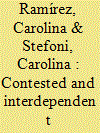

|
|
|
|
|
| Summary/Abstract |
This article examines experiences of making, inhabiting and appropriating space, in relation to the transformations of the political economy in an increasingly multicultural urban setting. Through processes of social production and construction of space, it explores the material, societal and symbolic processes at play. The entry points are memories, images, uses and material connection to Patronato neighbourhood (Santiago, Chile) by people of Korean and Palestinian ancestry. It analyses how claims of space authenticity, processes of ethnicisation and material appropriation of space – commonly understood as given by ‘cultural differences’ – respond to historical, economic and political shifts happening at a global and local level. Moreover, challenging the prism of socioeconomic conflict and separation, it shows emerging dynamics of social interdependence and adjustment, taking place alongside the reorganisation of ethnic boundaries. Such reorganisation allows settled migrants to develop a sense of belonging and control over space in a rapidly changing neoliberal city.
|
|
|
|
|
|
|
|
|
|
|
|
|
|
|
|
| 2 |
ID:
177976
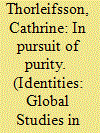

|
|
|
|
|
| Summary/Abstract |
Based on multi-sited fieldwork amongst leaders and supporters of populist radical right parties in the UK and Hungary, this article examines how the boundaries of the nation were reinforced and reimagined in the context of the ‘refugee crisis’ in 2015. Examining processes of racialization propagated by the UK Independence Party (UKIP) and the Hungarian Jobbik party, it suggests that the figure of the Muslim migrant served to rejuvenate violent imaginaries of ethno-racial and religious-civilizational difference. UKIP did not seek to reinforce national identity around a whiteness that was explicitly racially marked, but rather referred to culture grounded in (Judeo) Christian civilization as a basis of inclusion and exclusion. In contrast, in Hungary, supporters emphasized ethnic criteria for inclusion, thus challenging the basic values and principles underlying liberal democracy. In both contexts, anti-immigration discourses claiming the protection of ethno-racial or cultural purity, served a similar function; to re-territorialize white identities.
|
|
|
|
|
|
|
|
|
|
|
|
|
|
|
|
| 3 |
ID:
177966
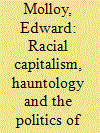

|
|
|
|
|
| Summary/Abstract |
This article explores the ways in which death can be understood to occupy a formative function in the construction of Irish national identity. The analysis of three distinct moments in Irish history (Plantation-era funerary practices, the Great Famine, and the 1981 hunger strikes) is undertaken with recourse to Michel Foucault’s understanding of race as it is deployed through disciplinary and biopower and Achille Mbembe’s concept of necropolitics. The continuing concern with history in Irish political discourse is juxtaposed with Derrida’s idea of ‘hauntology’. It will be seen that the act of remembering politically carries with it an ambivalent legacy, exposing the violence at the heart of the establishment of both states in Ireland, while maintaining the potential of emancipatory promise. This promise is itself rooted in the violence implicated in the production of alterity through the historical experience of death.
|
|
|
|
|
|
|
|
|
|
|
|
|
|
|
|
| 4 |
ID:
177979
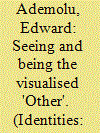

|
|
|
|
|
| Summary/Abstract |
This article examines how humanitarianism representations affect British Nigerian identities. It problematises the tendency within development literature to uncritically generalise British audiences of NGO representations as seemingly white. Studies further assume audiences interpret and are impacted by representations in largely undifferentiated ways. This assumption discounts the complexities and particularities of and within audiences and overlooks how humanitarian representations inform how (and why) audiences negotiate their racialised subjectivities. Applying Bhabha’s hybridity theory, this article reveals how Nigerian diaspora negotiate racialised identities vis-à-vis humanitarian representations in distinct and revelatory ways, including along the lines of social class. These Nigerian subject-makings are contingencies against problematic portrayals of Black African poverty and perceived racism mediated by whiteness. While focused on Nigerians, this work has implications for the racialised realities of UK-based Black Africans.
|
|
|
|
|
|
|
|
|
|
|
|
|
|
|
|
| 5 |
ID:
177981
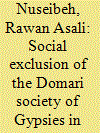

|
|
|
|
|
| Summary/Abstract |
This study looks into the lives of women from the Domari Society of Gypsies in Jerusalem. Residing in a conflict-ridden city and exposed to multiple stigmas, the study exposes the structures that perpetuate the disempowerment of Domari women in Jerusalem. It looks into their neighbourhoods, the social services available to them, the education services that they receive, their opportunities in the labour market, and the marriage patterns in the society. The study adopted qualitative research methods to allow the research participants to narrate their stories in ways meaningful to them. The narratives were analysed through an intersectional lens to expose the multiple oppressions these women are subject to. The women’s stories reveal high levels of stigma and isolation, which have disempowered members of the community and perpetuated the cycle of their exclusion.
|
|
|
|
|
|
|
|
|
|
|
|
|
|
|
|
| 6 |
ID:
177969
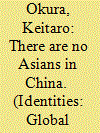

|
|
|
|
|
| Summary/Abstract |
Foreigners who arrive in the United States experience a process of racialization by which they adjust to the new racial realities of their host society. This paper presents a unique longitudinal study of racialization, drawing upon 30 interviews with 15 Chinese international students conducted twice per respondent over six months. The first interviews were carried out within two weeks of the students’ arrival in the U.S. to capture their pre-migration racial schemas and racial identity. Upon their arrival in the U.S., Chinese students primarily understand the concept of ‘race’ through the paradigm of nationality and racially identified as Chinese. Just half a year later, however, there was a striking shift towards a conceptualisation of race that emphasises phenotype over nationality, and some respondents began to identify with the pan-national racial label ‘Asian.’ I argue that these changes can be attributed to the process of racialization in the United States.
|
|
|
|
|
|
|
|
|
|
|
|
|
|
|
|
|
|
|
|
|